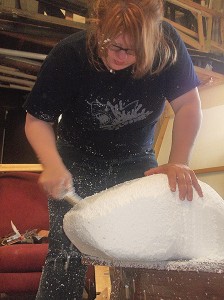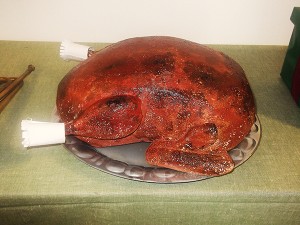
Adrienne Call is not just a props master — she is the props master.
Third-year theater tech major Call is the only theater tech major enrolled in New Paltz with a design concentration and an emphasis in properties (props). Because she’s the only student officially studying props, Call has faced several challenges and opportunities during her years at SUNY New Paltz.
“It’s very hard,” Call said. “I feel like there are a lot of demands put on me and expectations of me because I’m the only one willing to help out with props. The fact that I like doing it makes them expect even more out of me. It makes me expect more out of me.”
Call’s job as props master includes finding, buying and procuring all props necessary for a theatrical production. Objects that fall under the category of “props” technically range from a piece of jewelry to a live stage animal. The props master’s job is lengthy and tiring, as he/she is in charge of obtaining and maintaining these objects.
Andrew Ricci, a second-year theater tech major with a concentration in stage management and lighting design, said he understands the immense pressure props masters are under and gives Call, well, her props.
“She’s very dedicated to her work and she spends a lot of time on it, even during the off-hours,” Ricci said. “It has a lot of quality to it.”
 Coming to New Paltz, Call’s dilemma wasn’t that she was unsure of what she wanted to do — it was that she wanted to do it all.
Coming to New Paltz, Call’s dilemma wasn’t that she was unsure of what she wanted to do — it was that she wanted to do it all.
“Originally, I wanted to be a scenographer: someone who designs lights, costumes and sets,” Call said. “Someone suggested I try doing props to get a taste of sets and I ended up falling in love with it because it incorporated everything.”
As props master, Call collaborates with technicians in every concentration to create a finished product. She works with set designers to establish the setup of a scene, lighting designers to determine the direction in which a prop should be placed and costume designers to decide whether a garment is considered a costume or a prop.
Over the summer, Call worked with private theater companies as their props master. During an internship last summer, she worked at an outdoor theater for a summer stock festival, which entailed constructing, building and demolishing five shows in 10 weeks.
“It was difficult,” Call said. “There were days I didn’t sleep because I was working overnight taking down a show on a Sunday and putting the next one up by Wednesday. It was crazy.”
Although that experience was tough, the fact that she didn’t give up after such a grueling schedule solidified for Call that she’s exactly where she belongs.
Ideally, after college, Call said she would like to attend graduate school. However, the obscurity of her field means that her options are very limited — there are only three props programs in the country.
Call said she would like to travel and work on shows, eventually settling down with a stable career working with props and a teaching position at a university where she can share her passion for technical theater.
However, as stressful as being one in a million is, Call said she wouldn’t trade her trade for the world.
“There were times when I’ve stayed up for two days straight working on a show, times I’ve wanted to quit and then I look at the audience and I remember exactly why I do theater,” she said.
